There are several UK vet schools for you to choose from, and it is important to pick the right one. Here are seven distinctive features of our course which we believe make Cambridge the best place to study Veterinary Medicine.
What sort of students are we looking for?We are looking for students who show scientific potential and the ability to think critically and synthesise arguments, and who are motivated to enter a veterinary career. |
Studying to become a vet is challenging wherever you choose to do it, but the Cambridge course offers the most diverse and rewarding veterinary education experience possible. Cambridge provides a uniquely supportive environment in which to learn, succeed and enjoy your university years. Our veterinary school has a long tradition of producing the finest veterinary graduates – based on a combination of world-beating science, and a focus on practical skills. And remember:
- if you are doing well in school science/maths, you may find the Cambridge veterinary course is the easiest to secure a place on
- we do not require extensive vocational experience - we suggest ten working days, if possible
- you do not have to have a 'veterinary background' - few of our students have parents who are vets, and many come from schools and communities from which few students have gone on to study veterinary medicine
- a recent decision to apply for veterinary medicine is no disadvantage, and you do not need to be studying biology
- over 60% of applicants are interviewed, usually in two simple-format, half-hour, conversational interviews
- we welcome applications from candidates who have previously applied unsuccessfully to UK vet schools, including Cambridge, if they have since reached or exceeded our typical conditional offer
- we welcome applications from candidates with disabilities, specific learning disabilities or other health conditions
All the UK vet schools believe it is important that applicants make their choices based on accurate, unbiased information. To encourage this, the members of the Veterinary Schools Council have published the useful document Admissions processes and entry
requirements for UK veterinary schools - click the box in the right-hand column on that webpage. We have also collaborated in the pruduction of this Virtual Work Experience and Exploring the Veterinary Profession MOOC for people interested in applying (you do not need to pay to get the certificate at the end!)
In addition, the British Veterinary Association provides this resource for potential applicants.
1. An intensely practical course
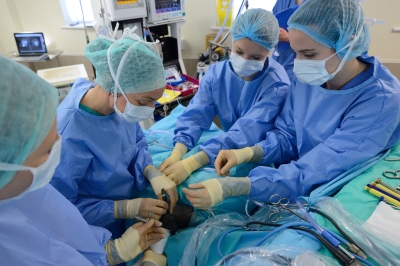 A major focus of the Cambridge course is its practical emphasis – progressively guiding you towards your clinical goals.
A major focus of the Cambridge course is its practical emphasis – progressively guiding you towards your clinical goals.
From their first week, our students learn handling and management skills in all the major domestic species, and subsequently with amphibians, reptiles, birds and ‘exotic’ mammals. In the early years this is supplemented by integrated sessions in clinical examination, thoracic auscultation, abdominal palpation, orthopaedic evaluation, echocardiography and neurological examination.
As the years progress these skills become central to your mastery of confident clinical examination in preparation for the entirely clinics-based final year. Indeed, Cambridge was the UK vet school which pioneered this all-practical final year in which students rotate in small groups throughout our hospital clinics.
Our students have the use of superb facilities – bespoke consultation and examination facilities, imaging and surgical suites, a linear accelerator for radiotherapy, clinical pathology and post mortem labs, and our Clinical Skills Lab is available 24 hours a day for students in all years.
"It’s only the end of my first term but I am very happy I chose to come to Cambridge to do Vet Med. I have already had real live practical sessions with cows, sheep, pigs, chickens, turkeys, rabbits, cats, dogs, budgies and horses – all of which helps you understand where everything you learn in lectures actually fits in." - Becky
2. A wonderful scientific environment
The key to being a great vet is combining practical skills with excellent grounding in the science underlying practice – and the Cambridge course provides just that.
 Cambridge gives you the unique opportunity to study to become a vet at the world’s premier science university – also consistently ranked as the best-funded and most productive UK university.
Cambridge gives you the unique opportunity to study to become a vet at the world’s premier science university – also consistently ranked as the best-funded and most productive UK university.
You will be fully immersed in our environment of cutting-edge biomedicine, and experience shows that this makes our graduates better equipped to deal with the high pace of change in veterinary medicine, and poised for a wide variety of flexible and challenging careers.
In the early years you will also sometimes be taught alongside Natural Science and Medicine students – an expression of the importance of the ‘One Health’ concept, a modern approach in which the wellbeing of animals, humans and the environment are considered to be inextricably linked.
Most important is the additional third year – when those of our vet students who do not already have a degree, study a single subject to a high level to gain a full Cambridge BA science degree. Most select a biological discipline, but other options are available, such as Management Studies – ideal for a role leading a veterinary practice.
The unique opportunities provided by a Cambridge veterinary education are invaluable in our graduates’ future career progression and flexibility. Indeed external feedback confirms that our graduates are better equipped to deal with unexpected clinical situations and the high pace of change in veterinary medicine.
3. Treating you as an individual
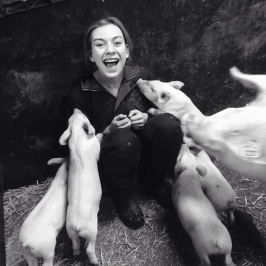 Ours is the smallest UK vet school, training 70-or-so vets each year, and this is central to our students’ experience.
Ours is the smallest UK vet school, training 70-or-so vets each year, and this is central to our students’ experience.
Right from the start, you will be in very small dissection, animal handling, and lab practical groups. You will also benefit from Cambridge’s unique ‘supervision’ small group teaching system – which gives you regular opportunities to consolidate your learning and follow up on your interests.
Later in the course, the small class size become even more valuable. Our clinical rotation groups are tiny, which ensures a high caseload, and thus more experience and confidence by the time you qualify.
Certainly, there is a friendly, informal atmosphere at the Vet School where staff are always available to offer individual support. This probably explains why Cambridge has one of the lowest ‘drop-out rates’ of any UK university.
“At Cambridge you're not just another face in a crowded room – tiny groups for dissection, animal handling and clinical rotations, as well as the small-group teaching system, ensure you get much more experience than at other vet schools.” - Max

4. The full ‘Cambridge experience’
All vet students at Cambridge are members of one of the University’s colleges – and most students say that, apart from the vet course itself, college life is the main reason they are glad they trained here.
For at least the first three years, and often more, our vet students live in college accommodation alongside 100-150 other students studying the whole range of subjects offered by the University.
Colleges are much more than halls of residence, though. They are often students’ main social hub, as well as providing pastoral support, academic and 'pre-professional' mentoring, and many of the facilities they use – for study, sport, music, and fun.
We strongly recommend you look into what the colleges can offer. Although each college is a little different, every one of them offers a great experience.
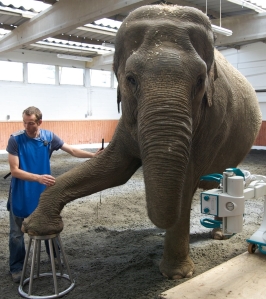
5. Helping with your finances
Affordability is becoming an increasingly important factor in choosing a veterinary course, and Cambridge has a lot to offer.
Being a vet student here is probably less expensive than you think. A student-led survey showed that, per-term, Cambridge is the least expensive UK vet school to attend (see the 'Help with your finances' menu tab).
Our students live in competitively-priced college accommodation for three-to-six years of their course, and the University is inexpensive in other ways, too.
There is an array of financial support available. The generous (up to £3500 a year) Cambridge Bursary supports students from low-income households, and there are also many sources a funding to prevent financial hardship, and also support student study, travel and recreation for all.
Ours is also the only vet school which provides some funding to support its students during their Extramural Studies.
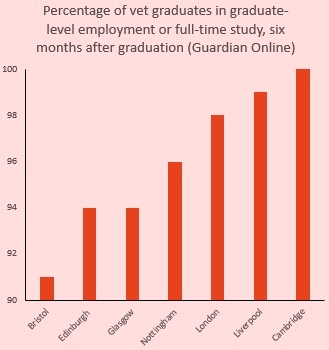 6. A springboard to a great career
6. A springboard to a great career
Vet school is just the start of your career journey, and Cambridge gives you the best start of all. The majority of our graduates go into veterinary practice when they graduate, and many stay for the rest of their careers - in farm, equine, small animal and exotics practice, in the UK and across the world.
For example, Cambridge veterinary graduates have the possibility of registering to practise in Hong Kong, Australia and New Zealand and at the time of writing they can also register to practise in other EU countries. Some of our graduates also go on to register to practise in the USA and Canada - contact us for advice if you are interested in this route.
This graph shows that employment rates after graduating from UK vet schools are extremely high, and Cambridge graduates usually find their first job quickly.
Those who decide to do further training, or study for qualification as a veterinary specialist find that the unparalleled scientific and clinical training they received at Cambridge puts them in an excellent position to further their career.
Cambridge vets are also well placed to exploit all the opportunities their (usually) science BA and veterinary VetMB degrees offer them, be they in scientific and clinical research, or teaching, industrial research, government or management.
For some examples of the varied things our graduates have gone on to do after graduating from Cambridge, click the 'Vet life after Cambridge' menu tab.
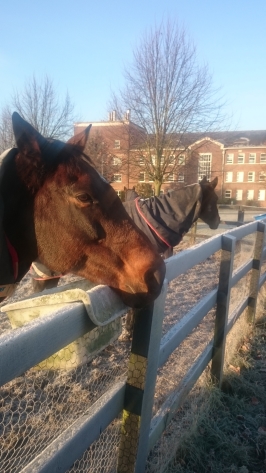
7. …all in a great location
Cambridge is a beautiful, exciting place to spend your university years.
Whether you’re shopping in the city’s medieval streets, spilling out of a steamy club late at night, or dodging cattle on the idyllic riverside walk along Grantchester Meadows, Cambridge has something for everyone. And once you have a bike, travel costs are zero.
Cambridge Vet School is only a ten-minute cycle ride from the very centre of the city – far closer than other UK vet schools. This means you can easily access the Vet School in your ‘pre-clinical’ years, yet not be isolated from all the city has to offer in your ‘clinical’ years.
The Vet School is at the centre of the University's exciting West Cambridge campus, along with Physics, Computer Science, Medical Physics, Chemical Engineering, Biotechnology, Nanoscience and the Entrepreneurship Centre. The Campus also includes the University's impressive sports hall, just two minutes' walk from the Vet School's front door, as well as the University Nursery.
“Cambridge is a fantastic place to study veterinary medicine - aside from providing a world class education, Cambridge offers opportunities and experiences like nowhere else. I have loved my time here and will treasure those memories forever.” - Joanne

